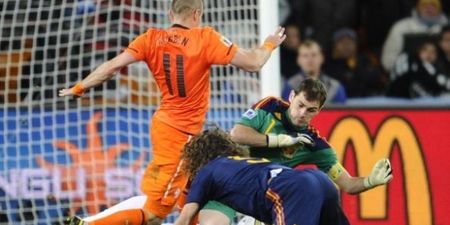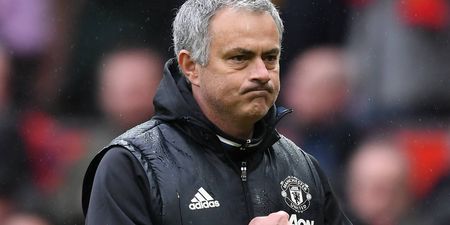
Spain may have needed three consecutive 1-0 wins to get this far, but the European champions are far from boring, writes Ken Early ahead of Sunday’s World Cup final.
Â
For once, Germany’s coach Jogi Loew was lost for words. “It’s hard to put your finger on it,” he said. “We didn’t play our normal game today, we were a bit inhibited and couldn’t quite snap out of it.” Loew’s stock-in-trade is the forensic analysis of opponents’ weaknesses, spelled out so simply that you’d wonder how the likes of England or Argentina had ever managed to win a match. Now he sounded more like a beaten England manager, offering up nebulous psychological explanations for a failure he couldn’t quite understand.
Loew, a good tactician in his own right, stands at the apex of the most sophisticated scouting & preparation operation in international football. For two years all those brains had worked together to answer a single question: how to beat Spain? And in the end they were forced to admit: if there is an answer, we haven’t found it yet.
Link: German experts predict offensive football
Spain have inched their way to the final with three 1-0 wins, which isn’t enough for some people. BBC Radio’s Robbie Savage tweeted during the first half of the semi: “This is f…ing boring watching keep ball with no penetration Spain have noone in the box zzzzzzzz”. In fact we were watching the best match of the tournament, a slow-burning yet epic drama in which Spain finally proved they could do in the World Cup what they had done in Europe two years ago.
Spain’s football is unanswerable but it’s not to everybody’s taste. Ethical considerations aside, tiki-taka is a bit like the other great Spanish contribution to spectator sport: the bullfight. There is a lot of seemingly pointless fannying about, then the same side always wins. Some people applaud the matador’s skill and artistry. Others are bored and find themselves hoping the bull sticks a horn in.
Bullfighting aficionados will say the only reason people get bored watching an endless procession of predictable slaughter is that they don’t understand what they’re seeing. The same thing could be said in defence of Spain. When they work a series of 20 passes around the midfield it might seem like they’re going nowhere. In fact Spain are playing the long game. Ask the Germans. Loew: “We spent too long chasing the ball, and used up all our energy at the back.” Schweinsteiger: “We spent a lot of time chasing the ball.” Klose:Â “Once we had it, we were too tired to do anything with it”. You tire out the bull before finishing him off.
Curiously, Spain never seem to get tired, even though they cover more ground than their opponents. Xavi always passes the ball more than any other player in a given match, but against Germany, the 30-year-old also moved more than any other player, a total of 12.2km. FIFA statistics show that for every five metres Mark van Bommel covers, Xavi covers six. That’s why he’s always in space to receive a pass. Xabi Alonso and the full-backs Juan Capdevila and Sergio Ramos are just behind Xavi in terms of distance covered. Spain’s tireless movement is testament to their discipline and desire. It also suggests that it’s easier to keep running when you’re making the play than when you’re chasing shadows – the energy dividend of creative football.
Unapologetic
Creative football is not something that weighs heavily on the mind of Holland’s midfield lynchpin, van Bommel. The Bayern player has become the focus of global astonishment as he hacks his way through games unnoticed by the referees. Van Bommel is unapologetic about his style: “Yes, I do the dirty work. A football team can’t be just 11 dancers.” But his reputation is now such that Howard Webb is bound to be watching him closely on Sunday.
At Thursday’s Holland press conference, I asked the coach Bert van Marwijk if he felt van Bommel’s cynical play was projecting the right image of Dutch football around the world. Narrowing his eyes slightly, van Marwijk said he disagreed that van Bommel was cynical, pointing out that he had been booked only once in the tournament. That booking was for kicking the ball away in celebration at what he mistakenly thought was the final whistle in Tuesday’s semi-final. By then he had committed 15 fouls without a yellow card – more than any other player in the tournament. Most remarkable was an attack on Uruguay’s Maxi Pereira, when van Bommel dummied the ball, knowing it would take the referee’s attention with it, and followed through with his studs into Pereira’s knee. It was an evil masterpiece, the foul play equivalent of Pele’s loop around the Uruguay keeper in 1970.
Van Bommel’s bullying puts off some neutrals, but many others will be attracted to Holland because they’re the underdogs, or because Spain’s probing and passing seems monotonous, or because they would like to see Holland at last gain redemption for 1974 and ’78. The good news for these people is that Holland, like the bull, have at least a puncher’s chance. They’ve won every World Cup match they’ve played including qualifiers, giving them the opportunity to record only the second “perfect” World Cup since Brazil in 1970. Spain are the best, but as Holland could tell them, just being the best doesn’t entitle you to win.
Â





















































